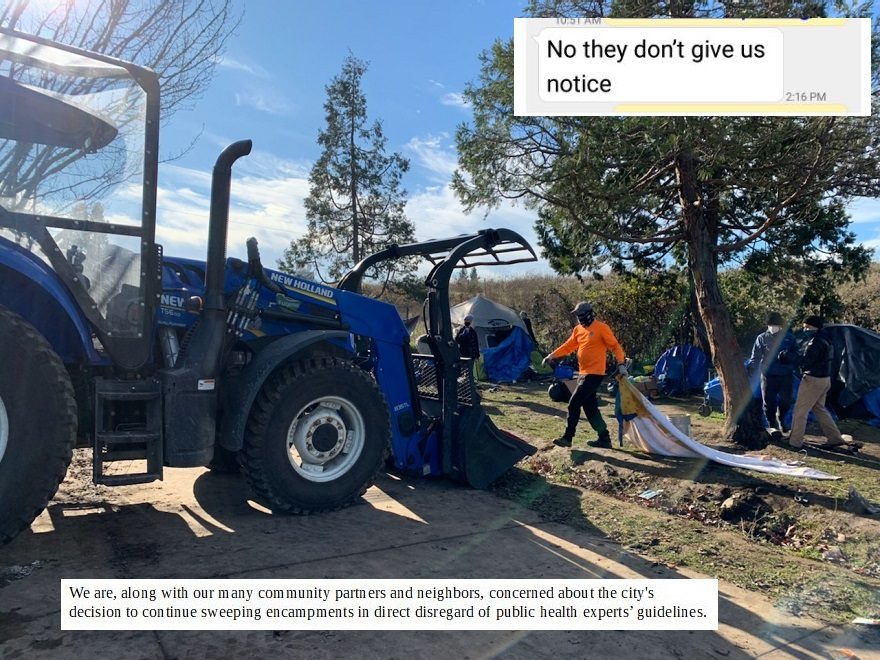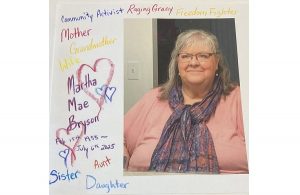Human Rights Commission group wants advance notice of sweeps
3 min read
Homeless advocates want 72 hours advance notice of future sweeps
To avoid repeating the brutality of the most recent Whiteaker camp eviction, a Human Rights Commission work group wants 72 hours notice before any future sweeps.
A misunderstanding between city staff and social service partners led the Mayor to believe and communicate in her Dec. 5 blog that aid partners were told of the sweep “several weeks in advance.”
They were not, the partners said.
Wesley Force spoke for Occupy Medical and Black Thistle Street Aid. “Unfortunately, the statement given to you by Mayor Vinis about being contacted to support campers is inaccurate. Our outreach team has been supporting the campers of their own initiative with no support or communication from the city besides a call between the mayor and our clinic manager in the days following the sweep.”
Stop Death on the Streets texted: “No they don’t give us notice”.
“Carry It Forward was not contacted by city staff before, during, or after the sweep,” Arwen Maas-Despain said. “The only people who contacted us were those that were swept and in need of supplies after the fact.”
Thank you for supporting
local citizen journalism
The sweep in the Whiteaker neighborhood evicted 120 unhoused people during a week of sub-freezing temperatures and a surge in COVID-19 infections.
Human Rights Commissioner Heather Sielicki noted that behavioral health service providers were upset by the public health hazards that are being created by the continuing sweeps. “Some were going so far as to say that the sweeps are super-spreader events,” she said.
Wesley Force also shared the Occupy Medical community’s concerns about the “direct disregard of public health experts’ guidelines.”
Moving forward, the Poverty and Homelessness work group wants the City to officially notify the Human Rights Commission 72 hours in advance of any future sweep.
Better communication is essential, according to homeless advocate Michael Gannon.
“We recognize that that sweep happened because the advocacy for unhoused people is so disorganized,” Michael said at the Dec. 9 work group meeting. “There are a number of places where communication between the unhoused and the people who are advocating for them need to be tended to, so those lines of communication are quick and effective and knowledgeable.”
In addition to the 72-hour notice, discussions among the Human Rights Commission, its Poverty and Homelessness Work Group, and others include the following ideas:
- 24-7 sweeps hotlines
- Legal actions based on the landmark Boise and Grants Pass cases, which found those cities’ treatment of the unhoused to be “cruel and unusual punishment”
- Ask the City to help the work group view all 400 responses to a recent survey of camp residents, and support similar future surveys
- Ask the City to train volunteers and community members on how to use the online hate and bias reporting system, https://www.eugene-or.gov/reporthate
- Encourage city staff, campers, and partners to share concerns and seek help for individuals with mental health issues before other people start perceiving a safety threat
- For sweeps that the city says are due to criminal activity, ask the city to evict and arrest only those individuals committing crimes, rather than sweep the whole camp; and
- Ask Eugene police to regularly visit the camps and inform the unhoused of their rights as part of the proposed EPD “Know Your Rights” campaign.
The “Know Your Rights” campaign is a proposal from Human Rights Commissioner Ibrahim Coulibaly to the new Eugene Police Department liaisons at their introductory meeting Nov. 19.
Ibrahim explained the program: “The police officer has to be able to explain in clear language to anybody in the community: ‘These are your rights when a police officer makes contact with you.’ “
The Eugene Police Department can build trust within the community by launching this program on its own, he suggested. If the police department leads the “Know Your Rights” training and discussion, people can trust them, he said.
“If a police officer pulls you over, these are your rights. It’s not all right for the person to say this to you. It’s not OK for the person to behave this way. You can ask for the person to call the supervisor, you can call this phone number,” Ibrahim said. “And when you start putting people in that situation — you start giving them tools to check what you are doing — they start trusting you.”
Updated Dec. 15 to (1) include comments from Carry It Forward, another aid organization identified by the City of Eugene as being given advance notice of the sweep, and (2) to provide background on the “Know Your Rights” campaign.



